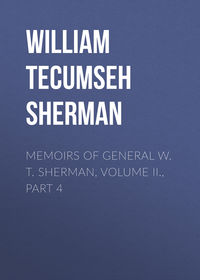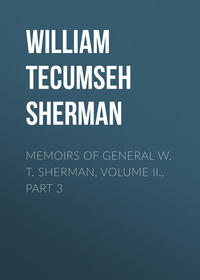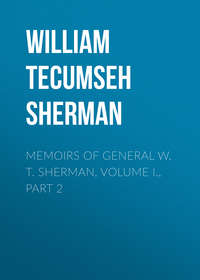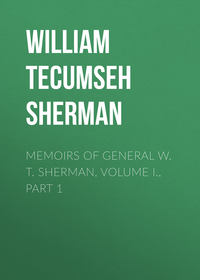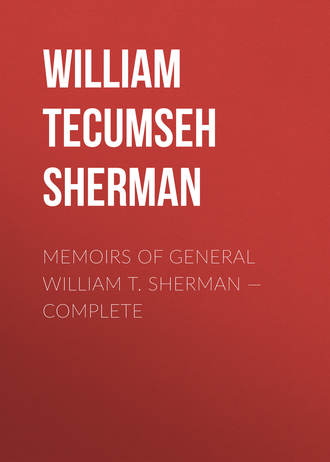 полная версия
полная версияMemoirs of General William T. Sherman — Complete
The panic grew worse and worse, and about the end of September there was a general suspension of the banks of New York, and a money crisis extended all over the country. In New York, Lucas, Turner & Co. had nothing at risk. We had large cash balances in the Metropolitan Bank and in the Bank of America, all safe, and we held, for the account of the St. Louis house, at least two hundred thousand dollars, of St. Louis city and county bonds, and of acceptances falling due right along, none extending beyond ninety days. I was advised from St. Louis that money matters were extremely tight; but I did not dream of any danger in that quarter. I knew well that Mr. Lucas was worth two or three million dollars in the best real estate, and inferred from the large balances to their credit with me that no mere panic could shake his credit; but, early on the morning of October 7th, my cousin, James M. Hoyt, came to me in bed, and read me a paragraph in the morning paper, to the effect that James H. Lucas & Co., of St. Louis, had suspended. I was, of course, surprised, but not sorry; for I had always contended that a man of so much visible wealth as Mr. Lucas should not be engaged in a business subject to such vicissitudes. I hurried down to the office, where I received the same information officially, by telegraph, with instructions to make proper disposition of the affairs of the bank, and to come out to St. Louis, with such assets as would be available there. I transferred the funds belonging to all our correspondents, with lists of outstanding checks, to one or other of our bankers, and with the cash balance of the St. Louis house and their available assets started for St. Louis. I may say with confidence that no man lost a cent by either of the banking firms of Lucas, Turner & Co., of San Francisco or New York; but, as usual, those who owed us were not always as just. I reached St. Louis October 17th, and found the partners engaged in liquidating the balances due depositors as fast as collections could be forced; and, as the panic began to subside, this process became quite rapid, and Mr. Lucas, by making a loan in Philadelphia, was enabled to close out all accounts without having made any serious sacrifices, Of course, no person ever lost a cent by him: he has recently died, leaving an estate of eight million dollars. During his lifetime, I had opportunities to know him well, and take much pleasure in bearing testimony to his great worth and personal kindness. On the failure of his bank, he assumed personally all the liabilities, released his partners of all responsibility, and offered to assist me to engage in business, which he supposed was due to me because I had resigned my army commission. I remained in St. Louis till the 17th of December, 1857, assisting in collecting for the bank, and in controlling all matters which came from the New York and San Francisco branches. B. R. Nisbet was still in San Francisco, but had married a Miss Thornton, and was coming home. There still remained in California a good deal of real estate, and notes, valued at about two hundred thousand dollars in the aggregate; so that, at Mr. Lucas's request, I agreed to go out again, to bring matters, if possible, nearer a final settlement. I accordingly left St. Louis, reached Lancaster, where my family was, on the 10th, staid there till after Christmas, and then went to New York, where I remained till January 5th, when I embarked on the steamer Moles Taylor (Captain McGowan) for Aspinwall; caught the Golden Gate (Captain Whiting) at Panama, January 15, 1858; and reached San Francisco on the 28th of January. I found that Nisbet and wife had gone to St. Louis, and that we had passed each other at sea. He had carried the ledger and books to St. Louis, but left a schedule, notes, etc., in the hands of S. M. Bowman, Esq., who passed them over to me.
On the 30th of January I published a notice of the dissolution of the partnership, and called on all who were still indebted to the firm of Lucas, Turner & Co. to pay up, or the notes would be sold at auction. I also advertised that all the real property, was for sale.
Business had somewhat changed since 1857. Parrott & Co.; Garrison, Fritz & Ralston; Wells, Fargo & Co.; Drexel, Sather & Church, and Tallant & Wilde, were the principal bankers. Property continued almost unsalable, and prices were less than a half of what they had been in 1853-'54. William Blending, Esq., had rented my house on Harrison Street; so I occupied a room in the bank, No. 11, and boarded at the Meiggs House, corner of Broadway and Montgomery, which we owned. Having reduced expenses to a minimum, I proceeded, with all possible dispatch, to collect outstanding debts, in some instances making sacrifices and compromises. I made some few sales, and generally aimed to put matters in such a shape that time would bring the best result. Some of our heaviest creditors were John M. Rhodes & Co., of Sacramento and Shasta; Langton & Co., of Downieville; and E. M. Stranger of Murphy's. In trying to put these debts in course of settlement, I made some arrangement in Downieville with the law-firm of Spears & Thornton, to collect, by suit, a certain note of Green & Purdy for twelve thousand dollars. Early in April, I learned that Spears had collected three thousand seven hundred dollars in money, had appropriated it to his own use, and had pledged another good note taken in part payment of three thousand and fifty-three dollars. He pretended to be insane. I had to make two visits to Downieville on this business, and there, made the acquaintance of Mr. Stewart, now a Senator from Nevada. He was married to a daughter of Governor Foote; was living in a small frame house on the bar just below the town; and his little daughter was playing about the door in the sand. Stewart was then a lawyer in Downieville, in good practice; afterward, by some lucky stroke, became part owner of a valuable silver-mine in Nevada, and is now accounted a millionaire. I managed to save something out of Spears, and more out of his partner Thornton. This affair of Spears ruined him, because his insanity was manifestly feigned.
I remained in San Francisco till July 3d, when, having collected and remitted every cent that I could raise, and got all the property in the best shape possible, hearing from St. Louis that business had revived, and that there was no need of further sacrifice; I put all the papers, with a full letter of instructions, and power of attorney, in the hands of William Blending, Esq., and took passage on the good steamer Golden Gate, Captain Whiting, for Panama and home. I reached Lancaster on July 28, 1858, and found all the family well. I was then perfectly unhampered, but the serious and greater question remained, what was I to do to support my family, consisting of a wife and four children, all accustomed to more than the average comforts of life?
I remained at Lancaster all of August, 1858, during which time I was discussing with Mr. Ewing and others what to do next. Major Turner and Mr. Lucas, in St. Louis, were willing to do any thing to aid me, but I thought best to keep independent. Mr. Ewing had property at Chauncey, consisting of salt-wells and coal-mines, but for that part of Ohio I had no fancy. Two of his sons, Hugh and T. E., Jr., had established themselves at Leavenworth, Kansas, where they and their father had bought a good deal of land, some near the town, and some back in the country. Mr. Ewing offered to confide to me the general management of his share of interest, and Hugh and T. E., Jr., offered me an equal copartnership in their law-firm.
Accordingly, about the 1st of September, I started for Kansas, stopping a couple of weeks in St. Louis, and reached Leavenworth. I found about two miles below the fort, on the river-bank, where in 1851 was a tangled thicket, quite a handsome and thriving city, growing rapidly in rivalry with Kansas City, and St. Joseph, Missouri. After looking about and consulting with friends, among them my classmate Major Stewart Van Vliet, quartermaster at the fort, I concluded to accept the proposition of Mr. Ewing, and accordingly the firm of Sherman & Ewing was duly announced, and our services to the public offered as attorneys-at-law. We had an office on Main Street, between Shawnee and Delaware, on the second floor, over the office of Hampton Denman, Esq., mayor of the city. This building was a mere shell, and our office was reached by a stairway on the outside. Although in the course of my military reading I had studied a few of the ordinary law-books, such as Blackstone, Kent, Starkie, etc., I did not presume to be a lawyer; but our agreement was that Thomas Ewing, Jr., a good and thorough lawyer, should manage all business in the courts, while I gave attention to collections, agencies for houses and lands, and such business as my experience in banking had qualified me for. Yet, as my name was embraced in a law-firm, it seemed to me proper to take out a license. Accordingly, one day when United States Judge Lecompte was in our office, I mentioned the matter to him; he told me to go down to the clerk of his court, and he would give me the license. I inquired what examination I would have to submit to, and he replied, "None at all;" he would admit me on the ground of general intelligence.
During that summer we got our share of the business of the profession, then represented by several eminent law-firms, embracing names that have since flourished in the Senate, and in the higher courts of the country. But the most lucrative single case was given me by my friend Major Van Vliet, who employed me to go to Fort Riley, one hundred and thirty-six miles west of Fort Leavenworth, to superintend the repairs to the military road. For this purpose he supplied me with a four-mule ambulance and driver. The country was then sparsely settled, and quite as many Indians were along the road as white people; still there were embryo towns all along the route, and a few farms sprinkled over the beautiful prairies. On reaching Indianola, near Topeka, I found everybody down with the chills and fever. My own driver became so shaky that I had to act as driver and cook. But in due season I reconnoitred the road, and made contracts for repairing some bridges, and for cutting such parts of the road as needed it. I then returned to Fort Leavenworth, and reported, receiving a fair compensation. On my way up I met Colonel Sumner's column, returning from their summer scout on the plains, and spent the night with the officers, among whom were Captains Sackett, Sturgis, etc. Also at Fort Riley I was cordially received and entertained by some old army-friends, among them Major Sedgwick, Captains Totted, Eli Long, etc.
Mrs. Sherman and children arrived out in November, and we spent the winter very comfortably in the house of Thomas Ewing, Jr., on the corner of Third and Pottawottamie Streets. On the 1st of January, 1859, Daniel McCook, Esq., was admitted to membership in our firm, which became Sherman, Ewing & McCook. Our business continued to grow, but, as the income hardly sufficed for three such expensive personages, I continued to look about for something more certain and profitable, and during that spring undertook for the Hon. Thomas Ewing, of Ohio, to open a farm on a large tract of land he owned on Indian Creek, forty miles west of Leavenworth, for the benefit of his grand-nephew, Henry Clark, and his grand-niece, Mrs. Walker. These arrived out in the spring, by which time I had caused to be erected a small frame dwelling-house, a barn, and fencing for a hundred acres. This helped to pass away time, but afforded little profit; and on the 11th of June, 1859, I wrote to Major D. C. Buel, assistant adjutant-general, on duty in the War Department with Secretary of War Floyd, inquiring if there was a vacancy among the army paymasters, or any thing in his line that I could obtain. He replied promptly, and sent me the printed programme for a military college about to be organized in Louisiana, and advised me to apply for the superintendent's place, saying that General G. Mason Graham, the half-brother of my old commanding-general, R. B. Mason, was very influential in this matter, and would doubtless befriend me on account of the relations that had existed between General Mason and myself in California. Accordingly, I addressed a letter of application to the Hon. R. C. Wickliffe, Baton Rouge, Louisiana, asking the answer to be sent to me at Lancaster, Ohio, where I proposed to leave my family. But, before leaving this branch of the subject, I must explain a little matter of which I have seen an account in print, complimentary or otherwise of the firm of Sherman, Ewing & McCook, more especially of the senior partner.
One day, as I sat in our office, an Irishman came in and said he had a case and wanted a lawyer. I asked him to sit down and give me the points of his case, all the other members of the firm being out. Our client stated that he had rented a lot of an Irish landlord for five dollars a month; that he had erected thereon a small frame shanty, which was occupied by his family; that he had, paid his rent regularly up to a recent period, but to his house he had appended a shed which extended over a part of an adjoining vacant lot belonging to the same landlord, for which he was charged two and a half dollars a month, which he refused to pay. The consequence was, that his landlord had for a few months declined even his five dollars monthly rent until the arrears amounted to about seventeen dollars, for which he was sued. I told him we would undertake his case, of which I took notes, and a fee of five dollars in advance, and in due order I placed the notes in the hands of McCook, and thought no more of it.
A month or so after, our client rushed into the office and said his case had been called at Judge Gardner's (I think), and he wanted his lawyer right away. I sent him up to the Circuit Court, Judge Pettit's, for McCook, but he soon returned, saying he could not find McCook, and accordingly I hurried with him up to Judge Gardner's office, intending to ask a continuance, but I found our antagonist there, with his lawyer and witnesses, and Judge Gardner would not grant a continuance, so of necessity I had to act, hoping that at every minute McCook would come. But the trial proceeded regularly to its end; we were beaten, and judgment was entered against our client for the amount claimed, and costs. As soon as the matter was explained to McCook, he said "execution" could not be taken for ten days, and, as our client was poor, and had nothing on which the landlord could levy but his house, McCook advised him to get his neighbors together, to pick up the house, and carry it on to another vacant lot, belonging to a non-resident, so that even the house could not be taken in execution. Thus the grasping landlord, though successful in his judgment, failed in the execution, and our client was abundantly satisfied.
In due time I closed up my business at Leavenworth, and went to Lancaster, Ohio, where, in July, 1859, I received notice from Governor Wickliffe that I had been elected superintendent of the proposed college, and inviting me to come down to Louisiana as early as possible, because they were anxious to put the college into operation by the 1st of January following. For this honorable position I was indebted to Major D. C. Buell and General G. Mason Graham, to whom I have made full and due acknowledgment. During the civil war, it was reported and charged that I owed my position to the personal friendship of Generals Bragg and Beauregard, and that, in taking up arms against the South, I had been guilty of a breach of hospitality and friendship. I was not indebted to General Bragg, because he himself told me that he was not even aware that I was an applicant, and had favored the selection of Major Jenkins, another West Point graduate. General Beauregard had nothing whatever to do with the matter. .
CHAPTER VII.
LOUISIANA
1859-1861In the autumn of 1859, having made arrangements for my family to remain in Lancaster, I proceeded, via Columbus, Cincinnati, and Louisville, to Baton Rouge, Louisiana, where I reported for duty to Governor Wickliffe, who, by virtue of his office, was the president of the Board of Supervisors of the new institution over which I was called to preside. He explained to me the act of the Legislature under which the institution was founded; told me that the building was situated near Alexandria, in the parish of Rapides, and was substantially finished; that the future management would rest with a Board of Supervisors, mostly citizens of Rapides Parish, where also resided the Governor-elect, T. O. Moore, who would soon succeed him in his office as Governor and president ex officio; and advised me to go at once to Alexandria, and put myself in communication with Moore and the supervisors. Accordingly I took a boat at Baton Rouge, for the mouth of Red River.
The river being low, and its navigation precarious, I there took the regular mail-coach, as the more certain conveyance, and continued on toward Alexandria. I found, as a fellow-passenger in the coach, Judge Henry Boyce, of the United States District Court, with whom I had made acquaintance years before, at St. Louis, and, as we neared Alexandria, he proposed that we should stop at Governor Moore's and spend the night. Moore's house and plantation were on Bayou Robert, about eight miles from Alexandria. We found him at home, with his wife and a married daughter, and spent the night there. He sent us forward to Alexandria the next morning, in his own carriage. On arriving at Alexandria, I put up at an inn, or boarding-house, and almost immediately thereafter went about ten miles farther up Bayou Rapides, to the plantation and house of General G. Mason Graham, to whom I looked as the principal man with whom I had to deal. He was a high-toned gentleman, and his whole heart was in the enterprise. He at once put me at ease. We acted together most cordially from that time forth, and it was at his house that all the details of the seminary were arranged. We first visited the college-building together. It was located on an old country place of four hundred acres of pineland, with numerous springs, and the building was very large and handsome. A carpenter, named James, resided there, and had the general charge of the property; but, as there was not a table, chair, black-board, or any thing on hand, necessary for a beginning, I concluded to quarter myself in one of the rooms of the seminary, and board with an old black woman who cooked for James, so that I might personally push forward the necessary preparations. There was an old rail-fence about the place, and a large pile of boards in front. I immediately engaged four carpenters, and set them at work to make out of these boards mess-tables, benches, black-boards, etc. I also opened a correspondence with the professors-elect, and with all parties of influence in the State, who were interested in our work: At the meeting of the Board of Supervisors, held at Alexandria, August 2, 1859, five professors had been elected: 1. W. T. Sherman, Superintendent, and Professor of Engineering, etc.; 2. Anthony Vallas, Professor of Mathematics, Philosophy, etc.; 3. Francis W. Smith, Professor of Chemistry, etc.; 4. David F. Boyd, Professor of Languages, English and Ancient; 5. E. Berti St. Ange, Professor of French and Modern Languages.
These constituted the Academic Board, while the general supervision remained in the Board of Supervisors, composed of the Governor of the State, the Superintendent of Public Education, and twelve members, nominated by the Governor, and confirmed by the Senate. The institution was bound to educate sixteen beneficiary students, free of any charge for tuition. These had only to pay for their clothing and books, while all others had to pay their entire expenses, including tuition.
Early in November, Profs. Smith, Yallas, St. Ange, and I, met a committee of the Board of Supervisors, composed of T. C. Manning, G. Mason Graham, and W. W. Whittington, at General Graham's house, and resolved to open the institution to pupils on the 1st day of January, 1860. We adopted a series of bylaws for the government of the institution, which was styled the "Louisiana Seminary of Learning and Military Academy." This title grew out of the original grant, by the Congress of the United States, of a certain township of public land, to be sold by the State, and dedicated to the use of a "seminary of learning." I do not suppose that Congress designed thereby to fix the name or title; but the subject had so long been debated in Louisiana that the name, though awkward, had become familiar. We appended to it "Military Academy," as explanatory of its general design.
On the 17th of November, 1859, the Governor of the State, Wickliffe, issued officially a general circular, prepared by us, giving public notice that the "Seminary of Learning" would open on the 1st day of January, 1860; containing a description of the locality, and the general regulations for the proposed institution; and authorizing parties to apply for further information to the "Superintendent," at Alexandria, Louisiana.
The Legislature had appropriated for the sixteen beneficiaries at the rate of two hundred and eighty-three dollars per annum, to which we added sixty dollars as tuition for pay cadets; and, though the price was low, we undertook to manage for the first year on that basis.
Promptly to the day, we opened, with about sixty cadets present. Major Smith was the commandant of cadets, and I the superintendent. I had been to New Orleans, where I had bought a supply of mattresses, books, and every thing requisite, and we started very much on the basis of West Point and of the Virginia Military Institute, but without uniforms or muskets; yet with roll-calls, sections, and recitations, we kept as near the standard of West Point as possible. I kept all the money accounts, and gave general directions to the steward, professors, and cadets. The other professors had their regular classes and recitations. We all lived in rooms in the college building, except Vallas, who had a family, and rented a house near by. A Creole gentleman, B. Jarrean, Esq., had been elected steward, and he also had his family in a house not far off. The other professors had a mess in a room adjoining the mess-hall. A few more cadets joined in the course of the winter, so that we had in all, during the first term, seventy-three cadets, of whom fifty-nine passed the examination on the 30th of July, 1860. During our first term many defects in the original act of the Legislature were demonstrated, and, by the advice of the Board of Supervisors, I went down to Baton Rouge during the session of the Legislature, to advocate and urge the passage of a new bill, putting the institution on a better footing. Thomas O. Moors was then Governor, Bragg was a member of the Board of Public Works, and Richard Taylor was a Senator. I got well acquainted with all of these, and with some of the leading men of the State, and was always treated with the greatest courtesy and kindness. In conjunction with the proper committee of the Legislature, we prepared a new bill, which was passed and approved on the 7th of March, 1860, by which we were to have a beneficiary cadet for each parish, in all fifty-six, and fifteen thousand dollars annually for their maintenance; also twenty thousand dollars for the general use of the college. During that session we got an appropriation of fifteen thousand dollars for building two professors' houses, for the purchase of philosophical and chemical apparatus, and for the beginning of a college library. The seminary was made a State Arsenal, under the title of State Central Arsenal, and I was allowed five hundred dollars a year as its superintendent. These matters took me several times to Baton Rouge that winter, and I recall an event of some interest, which most have happened in February. At that time my brother, John Sherman, was a candidate, in the national House of Representatives, for Speaker, against Bocock, of Virginia. In the South he was regarded as an "abolitionist," the most horrible of all monsters; and many people of Louisiana looked at me with suspicion, as the brother of the abolitionist, John Sherman, and doubted the propriety of having me at the head of an important State institution. By this time I was pretty well acquainted with many of their prominent men, was generally esteemed by all in authority, and by the people of Rapides Parish especially, who saw that I was devoted to my particular business, and that I gave no heed to the political excitement of the day. But the members of the State Senate and House did not know me so well, and it was natural that they should be suspicions of a Northern man, and the brother of him who was the "abolition" candidate for Speaker of the House.


